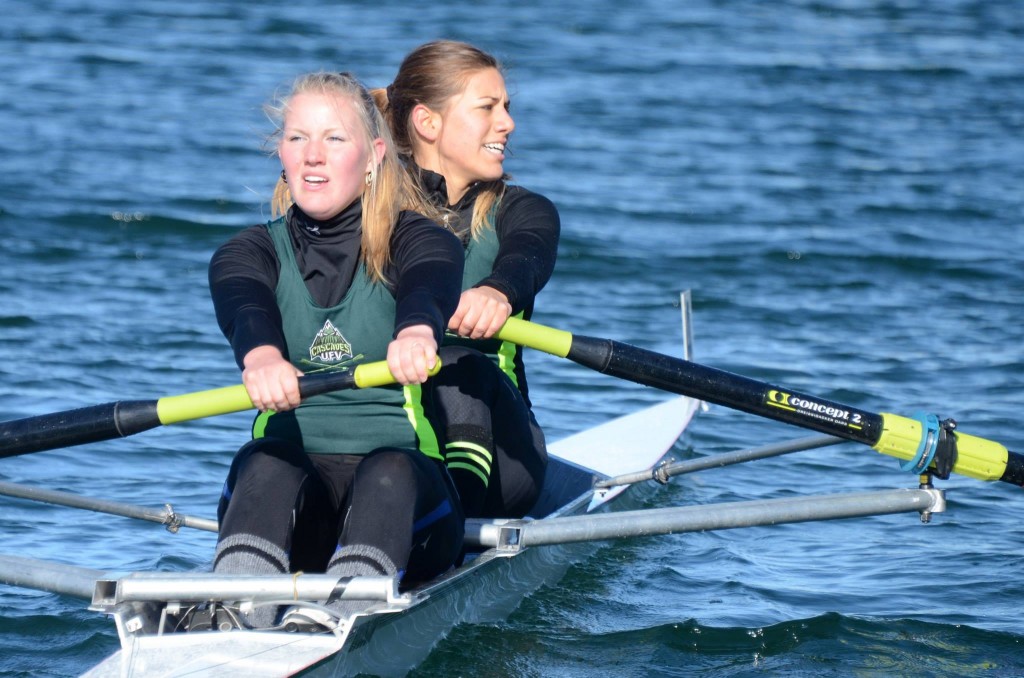Print Edition: November 20, 2013

UFV rowing has wrapped up competition for the semester after a competitive performance at Canadian University Rowing nationals in Montreal. Eight athletes took to the water on November 3 and 4 to test their mettle against some of the best university athletes in the country.
The rowers competed against representatives of 25 other schools, and participated in five events. The women’s team fielded Bethany Tait and Kaitlyn Block in the lightweight women’s 2x (double, female rowers <59.5 kg), and Raquel Martinez and Stephanie Shoenberger in the women’s pair. The men’s team consisted of Scott Micona and Ryan Tucker in the men’s pair, Caleb Davisson in the men’s single, and Emmett Campbell in the lightweight men’s single (<72 kg).
After a seventh-place finish nationally last season, hopes were high for the men’s pair. Unfortunately, one member of last year’s team was dry-docked by eligibility issues, catapulting sophomore Ryan Tucker into his first nationals appearance. Despite a costly “crab” stroke in their Saturday heat, the pair rebounded to a respectable ninth-place finish in their final to finish ahead of Ottawa, McMaster, Guelph, and Dalhousie.
“Both my worst moment and my proudest moment [of the season] happened in Montreal because of what happened on the time trials,” said coach Liz Chisholm. “[Micona and Tucker] were deflated, upset, embarrassed … I gave them half the day afterward just to walk away from it.”
“The way they came at their [Sunday] race was incredible to see,” Chisholm continued. “They came at it with a positive spirit. [I] watched them race bow ball to bow ball, and the other crew was in front of them, but they kept at it all the way through, and they overtook them in the last 250 metres. Their excitement at what they had done … changed it completely for them.”
The men’s team finished tied for 18th overall with zero total team points. The women’s team finished tied for 15th with seven team points: four from the lightweight women’s 2x, and three in the women’s pair.
All the athletes had to pay or fundraise for their flight, accommodations, and food (as well as qualify in their event at the October 20 Western Regional Championships in Burnaby). Some, like Campbell, were able to find sponsorship, while others were unable to attend because of cost.
“This year was a bit different because of the cost and funding,” said Campbell. “We brought a really small crew, we brought four girls and four guys … Last year we brought 12 guys and 11 girls, but it was because last year it was on the West Coast so it was easier to go to … it was probably the smallest crew I’ve ever gone to nationals with.”
The small crew also limited the number of events UFV athletes could compete in.
“Last year I had three races, three time trials, and then three heats afterwards,” said Campbell. “This year I only had one so there was a lot more emphasis on my one race. Everyone else was the same way.”
Campbell, a fifth-year who has captained the men’s team for the last two seasons, admits that most students aren’t aware of the work UFV’s rowing team puts into practice and competition throughout the year.
“When we have a race it’s the entire weekend,” said Campbell, “because you have to load your boats, you have to rig them all, and you have to get them all home. Every morning except for two days a week we’re on the water for an hour-and-a-half to two hours. We’re in the gym for an hour-and-a-half to two hours every day, except for one or two days a week … and then on top of that [rowers] are staying on top of school; they have to stay eligible. And there isn’t a lot of recognition to our sport so it’s very, very self-motivated. They’re not doing it for anybody but themselves and their teammates.”


